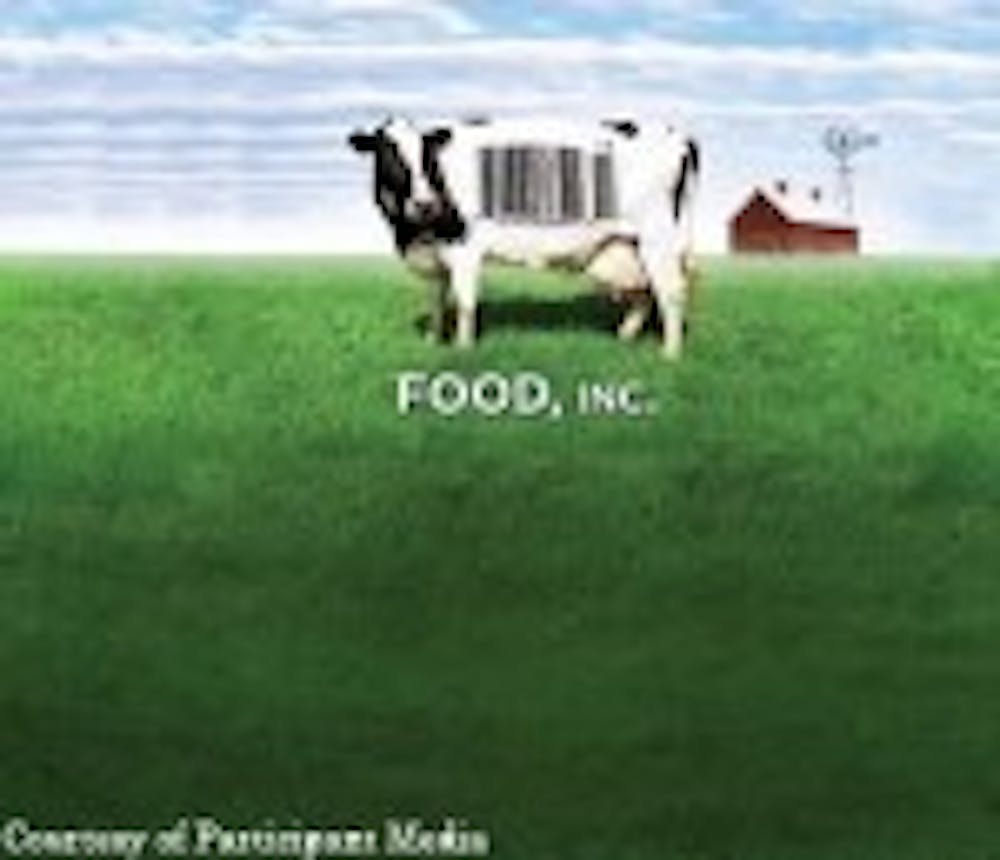There are problems with the food industry that most people would rather not hear.
Or eat.
The 2008 documentary, Food, Inc., by Robert Kenner, exposes and attacks the food industry, showing that huge companies such as Monsanto often threaten and sue its farmers when they veer from company policy.
The Hamburg Palace Theater hosted a special screening of Food, Inc. on Thursday.
Farmers are forced to comply with company standards, even if it hurts them and their crops. One example of this was when Monsanto sued a farmer for trying to clean grain without its permission. The farmer was forced to settle in court when he could no longer afford his legal fees.
Local farmers such as those from Lapp Dairy Farm, Hanova Hills Farm and Mariah Ridge Farm set up booths in the theater to showcase their products.
'We're trying to raise awareness of local farms,' said Melanie Kester of Mariah Ridge Farm. 'Everything we do is natural.'
Kathy Venezia, a local health advocate, also participated in the event.
'Local farms produce healthy foods,' Venezia said. 'Many of the health problems this country has today are due to factory farming. They are producing unhealthy foods at a substantial rate.'
Jill and Dan Chiacchia organized the event. Jill is a certified health counselor and member of the American Association of Drugless Practitioners. Like Venezia, she attended the Institute of Integrative Nutrition, a unique program based in New York that combines basic and modern food concepts to create healthier American diets.
The nutrition program and the documentary inspired her to organize the event.
'The documentary provides a great outlet,' Jill said. 'It presents impactful information in a visual and comprehensive way. It truly connects with the people.'
The film also highlights problems with the odious conditions of modern-day chicken coops and slaughterhouses. Chickens, pigs and cows are in very high demand. To meet the need, companies resort to cruel tactics such as overstuffing chickens and feeding corn to cows.
The film points out problems with current trend of grain production, mostly soybeans and corn. Over the past 50 years, corn has been made into hundreds of different variations and has dominated most foods Americans eat, from soda to cereal and even meat.
The documentary points out that farm subsidies from the government have kept this process going and it makes the case that it is economically and environmentally unstable.
'What's happening is that we're provided with industrialized food without the wholesome nature of food,' Dan said. 'It can be found everywhere. You can find it in 90 percent of the stuff in Wegmans. It hurts small farmers and, really, it is hurting everyone.'
The Chiacchias and the documentary encourage the audience to buy local products and avoid industrialized foods at all costs.
The documentary claims that, much like the tobacco industry, the food industry can be swayed to change its methods if the people demand it.
'My husband and I have both seen improvements in our health, mental clarity and energy levels,' Jill said. 'We're a very balanced family.'
Food, Inc. presents critical information in a clear, constructive manner. It places heavy emphasis on the farmers of America and what Americans can do to solve the problem.
According to the documentary, Americans can help by eating healthier and letting the government know of their concerns.
Although changes can be made in Washington and in the courts, an easier place to make them is on the kitchen table, three times a day.
E-mail: arts@ubspectrum.com





